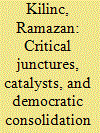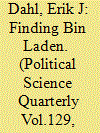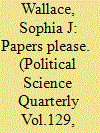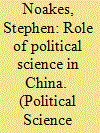|
|
|
Sort Order |
|
|
|
Items / Page
|
|
|
|
|
|
|
| Srl | Item |
| 1 |
ID:
133220


|
|
|
|
|
| Publication |
2014.
|
| Summary/Abstract |
THE RECENT LITERATURE ON CIVIL WARS IS WIDE and deep; a number of major studies compel us to rethink what we know about this important subject. One of the areas that has eluded concerted scholarly attention has been the question of how national armies can be developed that satisfy the imperatives of post-civil war reconciliation and democratic consolidation. This issue is at the center of this article.
Civil wars are fought for different reasons in very different settings and are resolved differently. Nevertheless, it is possible to draw valuable lessons of building national armies from even highly disparate attempts in very different post-civil war environments. The principal goal of this article is to highlight, through their contrasting achievements and shortcomings, lessons we can learn from three cases.
|
|
|
|
|
|
|
|
|
|
|
|
|
|
|
|
| 2 |
ID:
133225


|
|
|
|
|
| Publication |
2014.
|
| Summary/Abstract |
IN FEBRUARY 1997, THE TURKISH MILITARY INTERVENED in politics to protect secularism from the "rising Islamist threat." This intervention resulted in the toppling of the coalition government led by the Islamic-oriented Welfare Party (RP, Refah Partisi). Many civil and political restrictions followed this intervention, including the closure of the RP by the Constitutional Court. Two years later, the Chief of Staff, Hüseyin K?vr?ko?lu, stated that "the 28 February process," by which he meant the military-sanctioned political configuration,would continue for one thousand years if necessary.1 However, by 2012, only 15 years after the intervention, the military's ability to shape politics has diminished notably. By any measure, the civilian oversight of the military is now at its highest level since the first military coup in modern Turkey in 1960.2 The Islamic-oriented Justice and Development Party (AK Party, Adalet ve Kalk?nma Partisi)3 stayed in power for more than a decade. Furthermore, Turkey implemented several democratic reforms that reversed the authoritarian movement of the period immediately after the 1997 military intervention. Additionally, the Parliament passed laws that liberalized the Press Law, Turkish Penal Code, the state policies toward religious minorities, rights for Kurdish minorities, and human rights regulations.4 Since Turkey transited to multi-party politics in 1945, it has experienced four military interventions (1960, 1971, 1980, and 1997); each time, the military built a political system that maintained its influence even after the transfer of power to civilian government. Given Turkey's long history with military tutelage, including its orchestrated effort to redesign Turkish politics in the late 1990s, these liberalizing reforms have been revolutionary for democratic consolidation. Therefore, it can be asked: How did Turkey recover and consolidate its democracy within such a short period?
|
|
|
|
|
|
|
|
|
|
|
|
|
|
|
|
| 3 |
ID:
133219


|
|
|
|
|
| Publication |
2014.
|
| Summary/Abstract |
MUCH OF THE DISCUSSION ABOUT THE HUNT FOR and killing of Osama bin Laden has focused on the remarkable abilities of the U.S. Special Operations Forces who carried out the raid. Accounts by journalists and others revealed more than was previously known about the Navy SEALs who were involved, and sparked complaints by critics that the Barack Obama administration had leaked sensitive information in order to portray its own actions in a positive light.1 Terrorism experts have debated whether the killing would weaken al Qaeda, and what it would mean for the future of international terrorism.2 And other scholars and analysts have considered what the story of bin Laden's death reveals about American national security and foreign policy decision making. Graham Allison, for example, writes that "this case demonstrates that the U.S. government is capable of extraordinary performance in extraordinary circumstances.
|
|
|
|
|
|
|
|
|
|
|
|
|
|
|
|
| 4 |
ID:
133223


|
|
|
|
|
| Publication |
2014.
|
| Summary/Abstract |
THE QUOTATION ABOVE FROM THE SPONSOR of Arizona's SB 1070, former Senator Russell Pearce, exemplifies the Republican rhetoric focused on the problem of undocumented immigration and border security that has dominated discussions of immigration over the past decade. The negative media coverage and controversy among constituents eventually bubbled into a push to recall Senator Pearce, which was successful in the November 2011 elections.1 Arizona's SB 1070 criminalizes failure to carry proof of legal immigration status as a state misdemeanor; requires the police to determine the immigration status of a person detained in a lawful stop, detention, or arrest if there is a reasonable suspicion that the person might be undocumented; and prohibits local and state officials from limiting or restricting enforcement of federal immigration laws. In essence, the law is broad in its attack on undocumented immigrants and grants substantial power and discretion to the state and local level for enforcing immigration laws.
|
|
|
|
|
|
|
|
|
|
|
|
|
|
|
|
| 5 |
ID:
133221


|
|
|
|
|
| Publication |
2014.
|
| Summary/Abstract |
INTELLECTUALS HAVE HISTORICALLY BEEN AMONG the foremost advocates of political reform in repressive autocratic states. During the early decades of the twentieth century, scholars and writers served as chief witnesses to the atrocities arising from events such as the Spanish Civil War, Nazism, and the Stalinist purges. Later, they formed the basis of the samizdat movement that played an integral part in the destruction of European communism.1 Indeed, the leftist intelligentsia of the former USSR and its satellites became some of those regimes' most ardent critics and the instigators of revolutionary political change.2 More recently, intellectuals have led calls for liberalization in the Color Revolutions of central and southern Europe, as well as sub-Saharan Africa and the Middle East, in some cases even transitioning from academic life into new roles as politicians.3 The late Václav Havel in Czechoslovakia and Kosovo's Ibrahim Rugova are just two of the most ready examples.
|
|
|
|
|
|
|
|
|
|
|
|
|
|
|
|
| 6 |
ID:
133226


|
|
|
|
|
| Publication |
2014.
|
| Summary/Abstract |
WHEN RAYMOND MOLEY PUBLISHED AFTER SEVEN YEARS IN 1939, commentators questioned whether it was appropriate for a close presidential adviser to recount his story while the administration was still in office. This may be a bad practice, but one we are now accustomed to. These memoirs are welcomed not only by scholars and the interested public, but also by opponents of the administration, because while they will be discounted if they are favorable, if critical, they are likely to carry significant weight. So Democrats saw former Secretary of the Treasury Paul O'Neill's story as clear-sighted and doing his democratic duty of informing the public that George W. Bush and his colleagues were preoccupied by Iraq even before the attacks of 11 September 2001 at the expense of dealing with many other pressing problems.1 The partisan tables are turned with the publication of Robert Gates's Duty: Memoirs of a Secretary at War.2 Although not entirely uncritical of Bush or unadmiring of Barack Obama, it does cast a harsher light on the latter's administration, if not upon Obama personally. But so much has been written about both administrations, and especially the wars in Afghanistan and Iraq that take up most of Gates's account, that there are few substantive surprises. It is hardly news that Bush often made belligerent statements that interfered with diplomacy, that there was a great deal of friction between the Obama White House and the State and Defense Departments, or that the one thing that unified the departments and the President's staff was that they found Congress partisan, meddlesome, and infuriating.
|
|
|
|
|
|
|
|
|
|
|
|
|
|
|
|
|
|
|
|
|